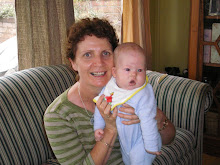Sunday, March 2, 2008
Helping Woman Make Choices
What motivates women to make the choices they make about the the place they give birth? Would they make different choices if they know that where they give birth will have impact on their birth outcome? I have often wondered this and after speaking with many women on the Birth Beyond Fear program realize that as midwives we have a huge potential to influence women to in this choice. But do we? Women know very little about the differences in outcomes of their births in relation to caregiver or place of birth and as midwives we definitely know. Who hasn't had a friend ask "who is the best doctor to go to?" "Which is the best hospital?" We as midwives are there with women and we see what happens to them. How can we use this knowledge in a professional way to benefit women? By of course asking them them what they want, overcoming their fears regarding childbirth, as often their choices are based in fear and giving them information to make an informed choice. Sound easy? It is! We must as caregivers eliminate our own and women's fear surrounding childbirth or we have very little chance of stemming the tide of unnecessary intervention. In my privileged position as both a midwife and Birth Beyond Fear practitioner I have assisted many woman make these choices that have been best for both themselves and their baby.
Subscribe to:
Post Comments (Atom)

2 comments:
Yes I agree with you that midwives can have an impact on the choices women make. I think that there are several issues here. Firstly, its about models of care. As midwives, we need to see women early in the antenatal period from 10 - 12 weeks. In Freeman's article (1) "The influence of the birthplace and models of care on midwifery practice for the management of woman in labour", summarises that the birth place did influence midwifery practice in labour. Also that the majority of midwives that provided labour care in large obstetric hospitals identifeid practices dominated by the medical model of care. This practice was described as being influenced by intervention and the need for technology, however this did not effect the womans ability to be involved in the decision making role and working in partnership with the midwife. What was evident was that the decisions made by midwives caring for women in labour were generally made based on the needs of the women rather than the hospital protocols.
The midwives within this study had adopted and humanistic approach to care combining technology and partnership to provide woman centered care. I feel we need to focus on providing midwifery led care.
Secondly, I think that private health insurance influences childbirth in WA. A large percentage of women are privately covered and therefore it becomes a bit of a status symbol to have a private obstetrician. As midwives we need to work more collaboratively with the private health sector to increase womens' awareness of the MIDWIFE'S role.
Midwifery care is based on a philosophy of pregnancy and birth as a normal phsiological process. Midwives promote the normal physiological care together with providing psychosocial support and providing women with informed choices within a safe enviornment. As midwives we need to remember not to work based in fear, or fear of litagation, because it is then that we lose our focus and instinctive way of being 'with woman' being a MIDWIFE.
Ref: (1) Women and Birth, Vol 19, Issue 4, December 2006, p 97-105
Thanks Pauline your insights are always interesting and most welcome
Post a Comment